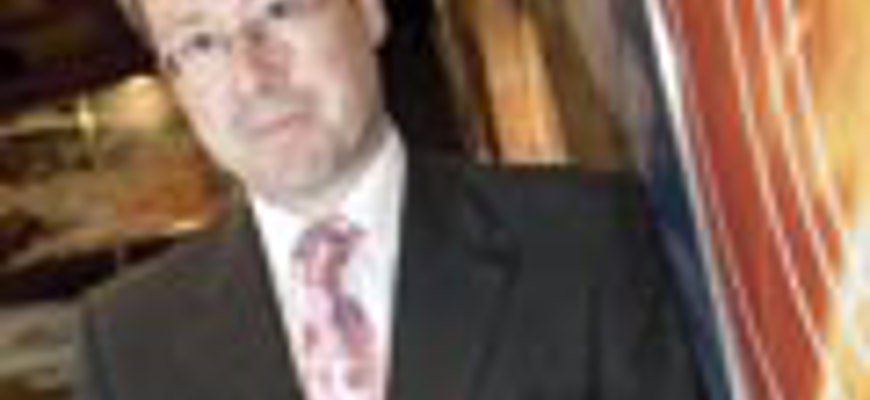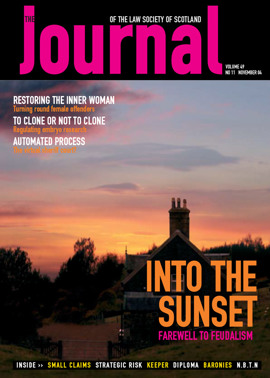Our dynamic profession

By common consent, Nothing.but.the.Net 2004, held in the new and airy surroundings of Edinburgh’s Our Dynamic Earth, was the most successful incarnation yet of Scotland’s most popular legal IT conference. Few who witnessed the dot.com collapse of 2000 would have predicted that an event designed to attract IT-aware lawyers four years later would find itself sold out with a waiting list of 40, but such was the demand for places that this is the happy situation the organisers, Update, found themselves in this year.
The keynote speaker at the conference was Elish Angiolini, the Solicitor General. As a matter of courtesy her presentation is reported first. True to form with all busy court practitioners, however, she was “unavoidably detained in another place”, answering MSP questions, and thus the audience was treated to her keynote speech at the very end of the day. This did not appear to detract from anyone’s enjoyment of the Solicitor General’s presentation, which gave a fascinating insight into the progress the Scottish law enforcement and court agencies have made in the sharing of information – truly a model of knowledge management using the Integration of Scottish Criminal Justice Information Systems (ISCJIS), which was much praised in the Soham Inquiry. The presentation also discussed future uses of technology to speed up the criminal courts.
No one can accuse the Law Society’s Update team of being insensitive to the needs of delegates. The ubiquitous feedback forms, perhaps sometimes a little grudgingly filled in, are always carefully studied. This year’s event benefited from a number of requested changes. First, it was decided at an early stage to make the presentations as business focused as possible – we are long past the stage of delegates wishing to be dazzled by demonstrations of the latest technology. Secondly, the event was restructured so that there was more time for networking, with longer coffee breaks and a longer lunch break, as well as “less but more” in the sense of fewer concurrent seminars, lessening delegate movements whilst preserving high quality.
The morning session was begun by Robert Turnbull, Assistant Commissioner (Scotland) from the Office of the Information Commissioner. Although the presentation was delivered in robust West Coast Scots brogue, and despite the speaker’s title, several delegates expressed puzzlement with the UK’s demarcation of responsibility for data protection and freedom of information matters. In a nutshell, the Information Commissioner based in England is responsible for all data protection issues throughout the United Kingdom as well as FOI issues in England and Wales. His Assistant Commissioner (Scotland) is a Scot who assists with Scottish data protection matters only but is based in Wilmslow. The Scottish Information Commissioner is responsible for FOI matters in Scotland, but not elsewhere in the UK, and has no responsibility for data protection matters in Scotland. Got that?
Derek Southall from Wragge and Co can always be relied upon to provide lively insight into cutting-edge legal IT applications that have some practical benefit, though this year he was anxious to inform delegates of his meal the previous night (in Edinburgh) at which the musician Chris Rea had sat at the next table. The delegates were willing to forgive such self-indulgence and the presentation lived up to expectations, with in particular a description of a web application that enables a single corporate in-house counsel to call up on screen, from anywhere in the world, details of all work, and billing details, for each lawyer and firm providing services to the organisation concerned.
Domain name disputes continue to hit the headlines from time to time and thus the talk given by Emily Taylor of Nominet was relevant to many delegates. Nominet’s dispute resolution machinery (in common with that of WIPO) has been something of a success story, so all were interested to learn of the recent changes, particularly the new circumstances in which Nominet will now cancel a domain registration automatically where the registrant is a company that is wound up.
The next presentation was given by Julie Berry, IT Director from Reynolds Porter Chamberlain, who described with just the right balance of weary resignation and steely determination the trials and tribulations of trying to persuade Luddite lawyers of the benefits of digital dictation, whilst trying to keep everyone happy. Since many firms in Scotland are experimenting with this technology the presentation received special attention, and was all the better for not being given by a solicitor!
The most thought-provoking presentation of the day was given by none other than Gordon Brewster of the Law Society of Scotland, unashamedly egged on by the Chairman. The subject matter of this discourse was “IT Doesn’t Matter”. Its central premise was that so many firms are now using IT systems that competitive advantage has long since vanished as a reason for acquiring new technology. IT, it was argued, is simply another commodity in the same way as heat, light, and water services. Some colourful audience participation (notably from Austin Lafferty) entertained the delegates in the run-up to lunch.
The catering at Our Dynamic Earth was excellent and the bright new venue itself a welcome change from the slightly overpowering atmosphere of the EICC’s vastness. Prior to the lunch break, it was announced to delegates that next year’s Nothing.but.the.Net will be held in Glasgow – so book early.
After lunch the conference reverted temporarily to its traditional format of parallel presentations. Iain Wisely of Morton Fraser attracted a packed audience for his excellent talk in relation to website disability issues, increasingly a concern for law firms both as providers of legal services and as employers. This detracted a little from the audience of Andrew Charlesworth of the University of Bristol, who nevertheless managed to address around 80 of the true “techies” on the subject of open source software and licences. This number is confirmation that quite a number of solicitors are starting to think of alternatives to lining the pockets of Bill Gates and his colleagues. When will we see the first Linux-equipped law firm in Scotland? Maybe there is one now.
Following afternoon coffee, in the last of the two parallel sessions, John Mackenzie of Masons gave an excellent analysis of the issues of confidentiality and data security facing the increasing numbers of mobile lawyers. This was a very relevant and timely presentation since law firms and lawyers increasingly have to entrust their IT to others, as digital dictation, mobile devices such as Blackberrys and PDAs, plus portable USB storage become part and parcel of the business of law.
Professor Stewart Brymer concluded the parallel session by delivering a spirited oratory on the subject of automated registration of title to land, and also addressed delegates at some length on the question of the so-called “Four Professors” report that considers the possible legal issues and implications of e-conveyancing. (Professor George Gretton mentioned this report in much the same vein at Nothing.but.the.Net 2003.) The report, which was instructed by the Keeper of the Registers in early 2003 and completed in April 2003, has not at the time of writing been made available for discussion.
If this author may express a personal view, as he did from the Chair, it was clear that many in the audience, reflecting the wider profession, wish to be involved in discussing the legal issues attending e-conveyancing that are understood to be raised by the report, and actively to participate in setting the scene for such an important change in conveyancing practice. It is to be hoped that the report will be made public, in full. The non-publication of the report sits in contrast with for example the decision on 15 September 2004 of the Sheriff Court Rules Council to undertake public consultation with 298 organisations on possible use of digital technology in the civil sheriff courts, including digital signatures that will also, almost inevitably, be required for e-conveyancing. This is just one area where a commonality of approach is desirable to avoid solicitors having to deal with fragmented solutions to essentially the same issue.
The efforts of the Update team in organising this event and running it smoothly on the day again deserve special thanks. The sponsors MTM Technology/Nflow Software are also to be congratulated for their vision in backing the event. Meantime, here’s hoping that Nothing.but.the. Net 2005 in Glasgow is even better – with 300 seats there is no excuse for non-attendance!
Paul Motion is a partner with Ledingham Chalmers, Edinburgh, and chaired Nothing.but.the.Net 2004In this issue
- Drafting consumer contracts
- Virtual firms: transactional learning on the web
- Ignorantia juris: it's all Greek to me
- Sheriff Court Rules Council consultation paper
- The Clinical Trials Directive - a summary
- Guarding the inner sanctum
- Neighbours in the global village
- Family law: is it the path for you?
- From sunset to sunrise
- What next for conveyancing?
- An ethical minefield
- Shredding the evidence
- Robbing the poor?
- Our dynamic profession
- A wider angle
- Keep the eye on the ball
- A rough guide to becoming a partner
- Rediscovering hope
- Sharpen your pencils
- Significant other
- Too far or not enough?
- Chipping away the infringers?
- View from Holyrood
- Website reviews
- Book reviews
- The Registers and the Appointed Day
- Feudal law: not just a relic
- Birth of a register






